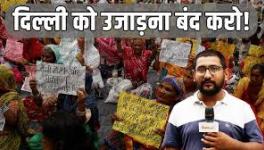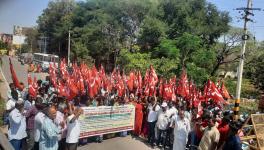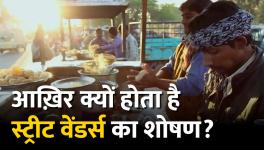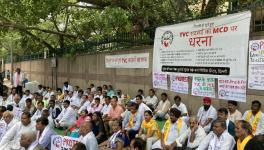COVID-19: No Relief in Sight for Invisible Street Vendors
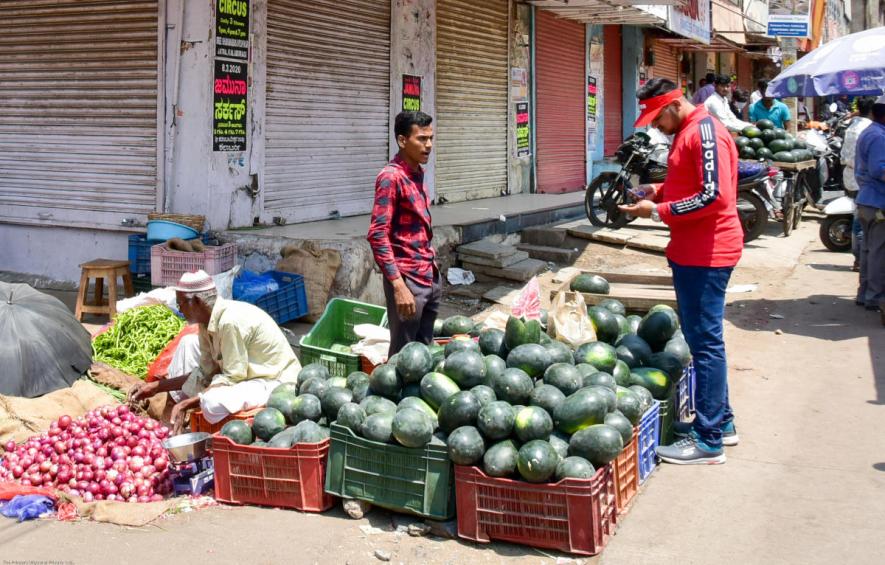
Image Courtesy: Deccan Herald
With a surge in the number of cases of COVID-19 in India, the nationwide lockdown seems unlikely to be lifted. The global crisis has exposed India’s fault lines – a deep seated inequality has left the lives of millions of street vendors on the line.
While those selling essential items such as vegetables and fruits are somehow able to earn their livelihoods, several others who sold food, clothes, and repaired items on the street are left in the lurch with no one to turn to but civil society for aid.
Fifty-two year old Ajay used to sell old clothes on the streets of Vikaspuri. He told NewsClick that he does not have a “ration card or any kind of documentation. I was living hand to mouth, but now I have nothing. We are on the brink of starvation.”
Another vendor, sixty-year old Changu Singh, had a flower stall on the streets of Shiv Vihar. “My son is a rickshaw driver and I am a flower vendor. Both of us have no source of income left,” he said. Singh added that amid the uncertainty surrounding the lockdown, “we are not provided any aid by the state. I am having to make do by asking others to provide us with help and rations, I don’t even know who to approach.”
So far, the state has not announced any concrete steps for many like Ajay and Changu who used to earn their living by selling items on the street. After pressure from civil society organisations, on April 3, the Centre said that street vendors who had valid ID cards or certificates may be allowed to continue with their businesses, subject to restrictions. Urban local bodies have reportedly identified vendors as per the Street Vendors Act, 2014, and have issued certificates and identification cards.
However, activists have said that the existing process of recognition had its own flaws and a large chunk of hawkers remains unidentified.
Unidentified and not Supported
Speaking to NewsClick, Chandan Kumar of the National Working People’s Charter said that while the government had issued a circular to take care of the vendors, “there is a massive issue of identification. While some have documents, a large chunk of those who we have been interacting with do not have any form of identification and are not a part of the database of the government. So far, no state has taken any steps to provide aid to street vendors,” he added.
Governments, such as that of Tamil Nadu have taken steps to provide relief to the tune of Rs 1000 for all registered street vendors. There are apprehensions about its timely disbursal and street vendors, unlike registered workers in welfare boards of the state, will not receive 15 kgs of rice, one kg dal, sugar and cooking oil. The government of Tripura has also announced the same. However, nothing has been announced by the Centre or other states so far.
Speaking to NewsClick, Mecanzy Dabre of the National Hawker’s Federation said that aside from vegetable vendors, “hawkers selling flowers, food and garments on the streets are the worst affected. There are over 400 million street vendors in India and out of that number 70% are food vendors. The remaining ones are street vendors earning between Rs 300 and Rs 700 per day; their lives have fallen apart and they do not have any resources.”
Help is only reaching a fraction of workers, because of lack of mapping of the vendors by the government. “The government does not have data. The data we provide is also not being considered by the government, which means that now we have to do as much as we can in our capacity to help the street vendors,” he added.
Read More: COVID-19: Street Vendors Lose Livelihood, Deprived of Relief Measures
Get the latest reports & analysis with people's perspective on Protests, movements & deep analytical videos, discussions of the current affairs in your Telegram app. Subscribe to NewsClick's Telegram channel & get Real-Time updates on stories, as they get published on our website.









